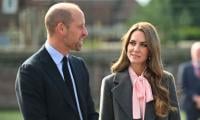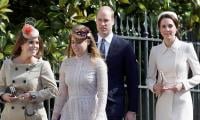First daughters
Culture Pop
Thousands of miles apart, two daughters are trying to navigate their developing paternal legacies in the spotlight. Both have spoken out in interviews this week to the mainstream press about their relationships with their famous fathers.
While one woman continues to work alongside hers in the exalted interiors of the West Wing, the other has seen her begetter forced out of the top public office in the land. This week, the American first daughter Ivanka Trump confessed to the Financial Times in a much-quoted interview that she can’t ultimately influence her “daddy’s” core conservative values with her supposedly more liberal ones. While Ivanka has long been promoted as the Donald’s “better half”, this admission has raised doubts about her abilities to be the quasi-liberal lobbyist in the Trump administration.
On the other side of the world, Nawaz Sharif’s daughter proudly proclaimed in a rare sit-down with Reuters (Pakistan’s former first family do not, as a matter of policy, give interviews) that she is a chip of the old Sharif block. “I am (Nawaz’s) reflection, I am his extension. I have grown up espousing his agenda, his ideology,” she said proudly.
Political observers and those in the PML-N’s upper cadres have, however, spoken about the former first daughter’s considerable influence on her father – particularly on issues close to her situation and heart. “She has a policy mind,” Mussadik Malik, Sharif’s spokesperson and a close friend disclosed to the news service. “Wherever she finds the policy space (on women, youth and minority issues) she pushes the envelope.” Her influence was apparently evident in pushing the honour killing bill home for one. Maryam has seen more success in getting her father to adopt uncharacteristically liberal causes than Ivanka, who famously was unable to convince her father to not back out of the Paris climate agreement in May.
The 43-year-old Maryam Nawaz may talk in strangely self-effacing tones, yet PML-N supporters would perceive this as a roar from the lair as she campaigns for the by-election for the Lahore constituency her father vacated upon disqualification by the Supreme Court. Wherever Maryam Nawaz goes in NA-120 to awaken the faithful to what she repeatedly calls a “conspiracy” against her father, she is hailed as “the lion” – a term normally reserved for the former prime minister.
The first daughter’s name may not even be on the ballot (the actual candidate is her mother Kulsoom, currently recovering from cancer abroad) but the real face of the campaign is Maryam Nawaz. Pictures of her in the national colour being festooned with rose petals at public gatherings across Lahore have been front-page fodder.
Like Ivanka, Maryam has a glamorous public persona with a large social media presence (the former has 4.55 million followers, the latter is fast approaching the four million mark). Ivanka’s Twitter feed is rather less boisterous than her father’s. But Maryam Nawaz is known to be a fiery and combative tweeter, often challenging political rival PTI chief Imran Khan openly. Khan, in turn, has disparaged her as a “Mughal princess”, which reminds us of the White House staff’s nickname for Ivanka Trump – “the Princess Royal”.
Both women suddenly turn coy and play down their role to avoid difficult political questions from the media. “I try to stay out of politics. I don’t profess to be a political savant,” Ivanka said in a Fox News interview. Though as an adviser to the US president, as CNN argued in a biting report, you need to be “qualified” for the role and have meaningful political expertise and advice to offer. Similarly, Maryam Nawaz is vocal about “a conspiracy” against her father but elusive when asked about the military possibly being involved. “It’s not my place to comment,” she apparently said to the BBC.
So what exactly is Maryam Nawaz’s place? Both women have not previously held public office. Yet Ivanka is now controversially ensconced in the West Wing as a senior adviser to President Trump and Maryam ran the Strategic Media Communication Cell at the PM House. And, Calibri notwithstanding, her position in the party has always been seen as long term, an embodiment of the next generation of the political Sharifs so to speak – the heir apparent.
The litmus test for Maryam Nawaz right now – whether she is a political princess as Imran Khan says or a “PML-N worker” as she describes herself to the BBC – is NA-120, the Lahore constituency vacated by her father, the former prime minister. By the time you are reading this, polling should be underway and there may even be some indication of which way the political tide will turn.
By-elections in Pakistan usually do not yield large voter turnouts. But this election is no run-of-the-mill contest. On one level, the results will impact Maryam Nawaz’s ability to rally the PML-N forces behind her and translate crowds into actual votes. Maryam is not a political novice as she has previously worked alongside her mother Kulsoom Nawaz to negotiate an exile deal from the Musharraf government and served as a crowd-puller for her father in the 2013 general elections. Equally, Ivanka Trump’s address to the Republican convention was a crucial indicator of her ability to make him more palatable to the party mainstream.
But by framing the election as a people’s court of protest against the Supreme Court’s decision against her father, she is whittling choices down to a knock-out round. “Your vote was disregarded, will you answer to this disrespect on September 17?” she asked the milling crowd at a rally. That, of course, is the question: will PML-N voters rise to the occasion?
Maryam Nawaz has dismissed the Supreme Court verdict against Nawaz Sharif as a “farce” and taken the case to the people. But will they respond decisively to a campaign that is built solely around Panama and conspiracy theories? Equally, the PTI has positioned NA-120 polls as an opportunity for the people to stand up against corruption and dynastic rule. The PTI candidate Dr Yasmin Rashid polled a respectable total against the former prime minister in 2013. The indicators, however, are that NA-120 is heading towards a win for the PML-N. But under these circumstances, a percentage swing in either direction will be indicative of the PML-N’s future prospects in the 2018 general elections. In this sense, NA-120 will reveal the mood of at least the heart of the Punjab, if not the nation.
So whether political princess or future prime minister, there is a lot at stake for both parties and, of course, for Maryam Nawaz who has led the battle in NA-120. But either way, perhaps the PTI chairman would be wise to remember that Mughal princesses like Jahanara wielded great power at the Mughal court. Dismissing even a modern-day incarnation would not be a wise move.
The writer is a journalist based in London and works with the BBC World Service as a broadcaster.
Twitter: @fifiharoon
-
 Inside Channing Tatum's Red Carpet Return After Shoulder Surgery
Inside Channing Tatum's Red Carpet Return After Shoulder Surgery -
 Ryan Coogler Brands 'When Harry Met Sally' His Most Favourite Rom Com While Discussing Love For Verstality
Ryan Coogler Brands 'When Harry Met Sally' His Most Favourite Rom Com While Discussing Love For Verstality -
 Sarah Pidgeon Explains Key To Portraying Carolyn Bessette Kennedy
Sarah Pidgeon Explains Key To Portraying Carolyn Bessette Kennedy -
 Justin Bieber Rocked The World With Bold Move 15 Years Ago
Justin Bieber Rocked The World With Bold Move 15 Years Ago -
 Sam Levinson Wins Hearts With Huge Donation To Eric Dane GoFundMe
Sam Levinson Wins Hearts With Huge Donation To Eric Dane GoFundMe -
 Kate Middleton Steps Out First Time Since Andrew Mountbatten-Windsor's Arrest
Kate Middleton Steps Out First Time Since Andrew Mountbatten-Windsor's Arrest -
 Inside Nicole 'Snooki' Polizzi's 'private' Marriage With Husband Jionni LaValle Amid Health Scare
Inside Nicole 'Snooki' Polizzi's 'private' Marriage With Husband Jionni LaValle Amid Health Scare -
 Germany’s Ruling Coalition Backs Social Media Ban For Children Under 14
Germany’s Ruling Coalition Backs Social Media Ban For Children Under 14 -
 Meghan Markle Shuts Down Harry’s Hopes Of Reconnecting With ‘disgraced’ Uncle
Meghan Markle Shuts Down Harry’s Hopes Of Reconnecting With ‘disgraced’ Uncle -
 Liza Minnelli Alleges She Was Ordered To Use Wheelchair At 2022 Academy Awards
Liza Minnelli Alleges She Was Ordered To Use Wheelchair At 2022 Academy Awards -
 Quinton Aaron Reveals Why He Does Not Want To Speak To Wife Margarita Ever Again
Quinton Aaron Reveals Why He Does Not Want To Speak To Wife Margarita Ever Again -
 Prince William And Kate's Photos With Andrew Used In New Campaign Against Royals
Prince William And Kate's Photos With Andrew Used In New Campaign Against Royals -
 Touching Eric Dane Moment With Daughter Emerges After Viral Final Words
Touching Eric Dane Moment With Daughter Emerges After Viral Final Words -
 Kate Middleton Quietly Backs Princess Beatrice, Eugenie As Andrew Scandal Intensifies
Kate Middleton Quietly Backs Princess Beatrice, Eugenie As Andrew Scandal Intensifies -
 Michael B. Jordan Shares His Thoughts On Growing Trend Of Live-action Anime Adaptations
Michael B. Jordan Shares His Thoughts On Growing Trend Of Live-action Anime Adaptations -
 Why Mikaela Shiffrin Celebrated Olympic Gold With Taylor Swift Song?
Why Mikaela Shiffrin Celebrated Olympic Gold With Taylor Swift Song?



